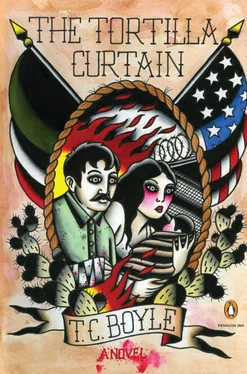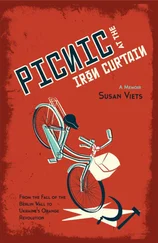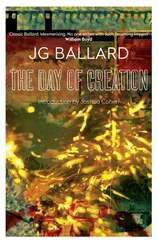T. Boyle - The Tortilla Curtain
Здесь есть возможность читать онлайн «T. Boyle - The Tortilla Curtain» весь текст электронной книги совершенно бесплатно (целиком полную версию без сокращений). В некоторых случаях можно слушать аудио, скачать через торрент в формате fb2 и присутствует краткое содержание. Год выпуска: 2011, Издательство: Penguin Books, Жанр: Современная проза, на английском языке. Описание произведения, (предисловие) а так же отзывы посетителей доступны на портале библиотеки ЛибКат.
- Название:The Tortilla Curtain
- Автор:
- Издательство:Penguin Books
- Жанр:
- Год:2011
- ISBN:нет данных
- Рейтинг книги:4 / 5. Голосов: 1
-
Избранное:Добавить в избранное
- Отзывы:
-
Ваша оценка:
- 80
- 1
- 2
- 3
- 4
- 5
The Tortilla Curtain: краткое содержание, описание и аннотация
Предлагаем к чтению аннотацию, описание, краткое содержание или предисловие (зависит от того, что написал сам автор книги «The Tortilla Curtain»). Если вы не нашли необходимую информацию о книге — напишите в комментариях, мы постараемся отыскать её.
The Tortilla Curtain — читать онлайн бесплатно полную книгу (весь текст) целиком
Ниже представлен текст книги, разбитый по страницам. Система сохранения места последней прочитанной страницы, позволяет с удобством читать онлайн бесплатно книгу «The Tortilla Curtain», без необходимости каждый раз заново искать на чём Вы остановились. Поставьте закладку, и сможете в любой момент перейти на страницу, на которой закончили чтение.
Интервал:
Закладка:
When they reached the top and the San Fernando Valley opened up beneath them like an enormous glittering fan, she had to stop and catch her breath. “Come on,” Cándido urged, leaning over her as she sat there in a patch of stiff grass, “there's no time to rest.” But she'd overestimated herself, and now she felt it: a pregnant woman grown soft in that prison by the stream. Her feet were swollen. She could smell her own sweat. The baby was like a dead weight strapped to the front of her. _“Un momento,”__ she whispered, gazing out on the grounded constellations of the Valley floor, grid upon grid of lights, and every one a house, an apartment, a walk-up or flat, every one the promise of a life that would never again be this hard.
Cándido crouched beside her. “Are you okay?” he whispered, and he, bent forward to hold her, press her head to his shoulder the way her father used to do when she was little and his favorite and she skinned her knee or woke with a nightmare. “It's not much farther,” he said, his breath warm on her cheek, “just down there,” and she made him point to a place beyond where the office buildings rose up like stony monoliths to a double band of lights running perpendicular to the great long vertical avenues that stretched on into the darkness of the mountains on the far side of the Valley. “That's it,” he said. “That string of lights there-see it? Sherman Way.”
_Sherman Way.__ She held the words in her head like a talisman, and then they were moving again, along the black swatch of the road that chased its own tail down the side of the hill. Cándido knew the shortcuts, steep narrow trails that plunged through the brush to pinch off the switchbacks at the neck, and he held her hand and helped her through the worst places. Her feet were like stone, clumsy suddenly. Needlegrass stabbed through her dress and things caught at her hair. And now, every time they made the pavement again, there were the cars. It wasn't yet light and already they were there, the first sporadic awakening of that endless stream, roaring up the road opposite them, and there was no joy in that. America kept her head down and skipped along as fast as she could go, eaten up with the fear of _La Migra__ and the common accidents of the road.__
By the time the sun was up, the ordeal was behind them. They were walking hand in hand up a broad street overhung with trees, a sidewalk beneath their feet, pretty houses with pretty yards stretching as far as they could see. America was exhilarated, on fire with excitement. All the fatigue of the past hours dropped magically away from her. Clinging to Cándido's arm, she peered in at the windows, examined the cars in the driveways and the children's things in the yards with the eye of an appraiser, gave a running commentary on each house as they passed it by. The houses were adorable, _linda, simpatica,__ cute. That color was striking, didn't he think so? And the bougainvillea-she'd never seen bougainvillea so lush. Cándido was mute. His eyes darted everywhere and he looked troubled-he was troubled, worried sick, she knew it, but she couldn't help herself. Oh, look at that one! And that!
They turned next onto a commercial boulevard, the main one in this part of the city, Cándido explained, and this was even better. There were shops, wall-to-wall shops, restaurants-was that a Chinese, was that what that writing was? — a supermarket that sprawled out over a lot the size of a _fútbol__ stadium with thirty shops more clustered round it. After Tepoztlán, Cuernavaca even, after the Tijuana dump and Venice and the leafy dolorous hell of the canyon, this was a vision of paradise. And when she came to the furniture store-the couches and settees and rugs and elegant lamps all laid out like in the Hollywood movies-Candido couldn't budge her. “Come on, it's getting late, you can look at this junk some other time, come on,” he said, tugging at her arm, but she wouldn't move. Not for ten whole minutes. It was almost as if she were in a trance and she didn't care. If she could have done it, she would have moved right into the store and slept on a different couch every night and it wouldn't have bothered her a whit if the whole world was looking in at the window.
Canoga Park was different.
It was pinched and meaner, a lot of secondhand shops and auto-parts stores, dirty restaurants and _cantinas__ with bars on the windows, but there were people just like her all over the streets and that made her feel better, made her feel for the first time that she too could live here, that it could be done, that it had been done by thousands before her. She heard Spanish spoken on the streets, nothing but Spanish. Children shot by on skateboards and bicycles. A street vendor was selling roasted ears of corn out of a barrel. América felt as if she'd come home.
Then Cándido took her into a restaurant, a little hole in the wall with five stools at the counter and a couple of Formica tables stuck in a corner, and she could have wept for joy. She fussed with her hair before they went in-she should have braided it-and tried to smooth down her dress and pick the fluff out of it. “You never told me,” she said. “I must look like a mess.”
“You look fine,” he said, but she didn't believe him. Hingálieve himow could she? She'd been camping in the woods without so much as a compact mirror for as long as she could remember.
The waiter was Mexican. The chef behind the grill was Mexican. The dishwasher was Mexican and the man who mopped the floor and the big swollen mother with her two _niñitos__ and the five men sitting on the five stools blowing into their cups of coffee. The menu was printed in Spanish. “Order anything you want, _mi vida,”__ Cándido said, and he tried to smile, but the look of worry never left his face.
She ordered _huevos con chorizo__ and toast, real toast, the first she'd had since she left, home. Butter melted into the toast, sweet yellow pools of it, the _salsa__ on the table was better than her mother had ever made and the coffee was black and strong. The sugar came in little packets and she poured so much of it into her coffee the spoon stood up straight when she tried to stir it. Cándido ordered two eggs and toast and he ate like an untamed beast let out of its cage, then went up to the counter and talked to the men there while she used the bathroom, which was dirty and cramped but a luxury of luxuries for all that. She looked at herself in the mirror through a scrim of triangular markings and slogans scratched into the glass and saw that she was pretty still, flushed and healthy-looking. She lingered on the toilet. Stripped to the waist and washed the top half of her body with the yellow liquid soap and let the water run in the basin long after she'd finished with it, just let it run to hear it.
Later, Cándido stood on the streetcorner with two hundred other men while she shrank by his side. The talk was grim. There was a recession. There was no work. Too many had come up from the South, and if there was work for them all six years ago, now there were twenty men for every job and the bosses knew it and cut the wage by half. Men were starving. Their wives and children were starving. They'd do anything for work, any kind of work, and they'd take what the boss was paying and get down on their knees and thank him for it.
The men slouched against buildings, sat on the curb, smoked and chatted in small groups. America watched them as she'd watched the men at the labor exchange and what she saw made her stomach sink with fear: they were hopeless, they were dead, as bent and whipped and defeated as branches torn from a tree. She and Cándido stood there for an hour, not so much in the hope of work-it was ridiculous even to think of it with two hundred men there-but to talk and probe and try to get the lay of the land. Where could they stay? Where was the cheapest place to eat? Was there a better streetcorner? Were they hiring at the building supply? In all that time, a full hour at least, she saw only two pickups pull in at the curb and only six men of all that mob climb in.
Читать дальшеИнтервал:
Закладка:
Похожие книги на «The Tortilla Curtain»
Представляем Вашему вниманию похожие книги на «The Tortilla Curtain» списком для выбора. Мы отобрали схожую по названию и смыслу литературу в надежде предоставить читателям больше вариантов отыскать новые, интересные, ещё непрочитанные произведения.
Обсуждение, отзывы о книге «The Tortilla Curtain» и просто собственные мнения читателей. Оставьте ваши комментарии, напишите, что Вы думаете о произведении, его смысле или главных героях. Укажите что конкретно понравилось, а что нет, и почему Вы так считаете.












